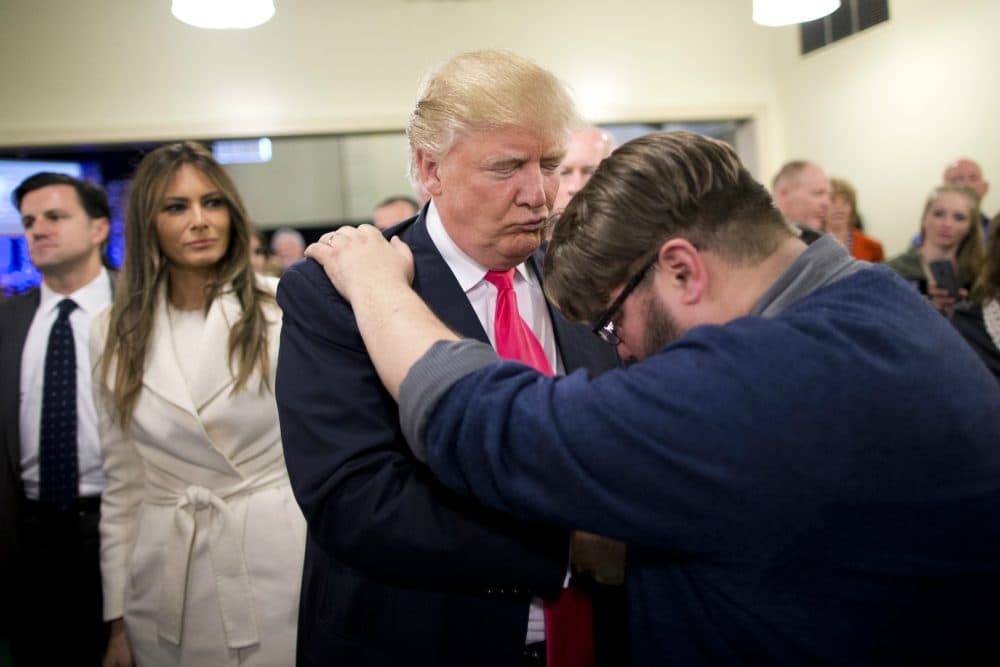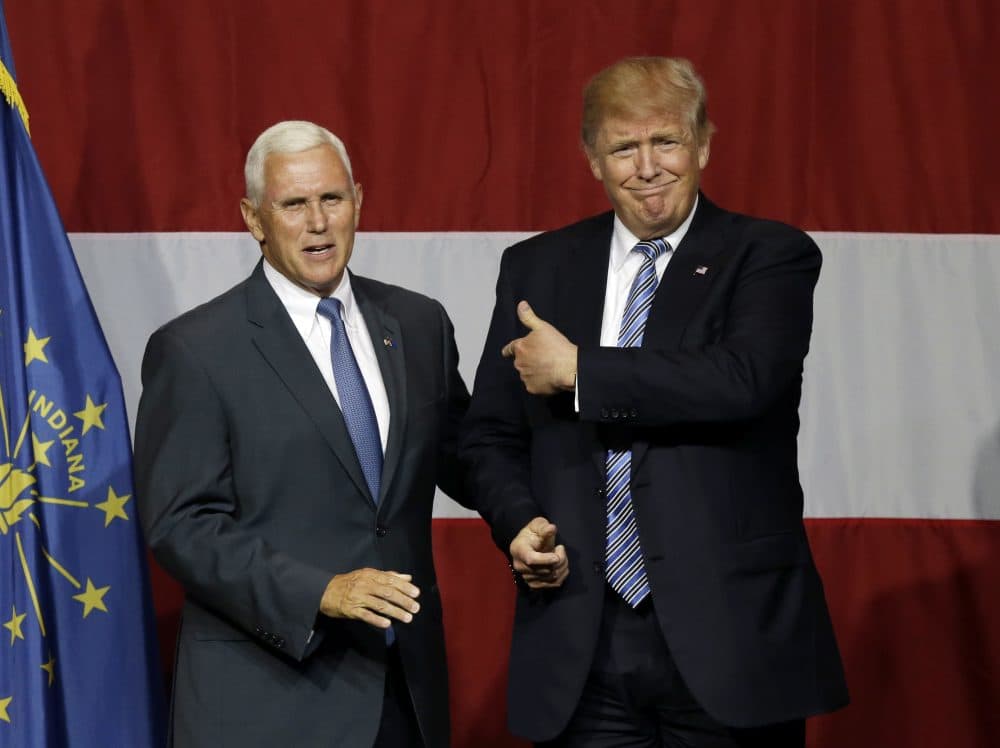Advertisement
The Real Reason White Evangelical Voters Support Donald Trump

In an attempt to bolster support among the party’s base and lend some gravitas to his carnival of a campaign, Barker-in-Chief Donald Trump selected Indiana Gov. Mike Pence as his running mate. Trump’s hope is that Pence, a self-declared evangelical Catholic whose reputation has been built on assaulting abortion and LGBT civil rights under the banner of religious freedom, will rally Republican evangelicals to his cause. But if that was his sole motivation, he needn’t have bothered. He’s already got them.
According to a Pew Research Foundation study (conducted before Trump announced his choice of Pence), white evangelicals overwhelmingly support Trump, with 78 percent saying that they would vote for him. Now in fairness, only about a third “strongly” back him, while 42 percent say it will be difficult to choose between Trump and Clinton because “neither one would make a good president.” In fact, antipathy toward Clinton is the dominant emotional driver among many of these prospective Trump voters, with 45 percent of them characterizing their vote for Trump mainly as a vote against Clinton.
cultural norms change, and when the status associated with membership in the admired crowd erodes, so does the unconscious sense of privilege that goes with it.
No, what’s more interesting is that these voters tilt toward Trump despite the concerns expressed by some of their leaders about whether the candidate truly shares their Christian values, and despite the fact that 44 percent of these Republicans view Trump as “not too” or “not at all” religious.
What accounts for this apparent paradox?
“… Even if many evangelicals do not think he shares their religious commitment, most do think that Trump understands the needs of people like them,” the Pew study explains. “Indeed, fully six-in-10 white evangelical voters (61 percent) say they think Trump understands their needs “very” or “fairly” well, while just 24 percent say this about Clinton.”
So who are the “people like them”? What needs or aspirations or disaffections do they feel Trump understands?
The answer may lie in this fascinating Pew statistic: “A growing share of self-identified 'evangelical or born-again' Protestants (41 percent) say it has become more difficult to be an evangelical Christian in the U.S. in recent years.”
Difficulties tend to make us frustrated and angry; they drive us to lash out. And lashing out is one of Trump’s two staple responses to the world (the other being self-aggrandizement, which is less contagious).

But are the perceived difficulties real? Has any state or federal government body banned the wearing of crucifixes, barred people from attending church services, forced citizens to have abortions or marry someone of the same sex? Other than mandating that they may not actively discriminate, has any agency or law constrained the freedom or rights of evangelicals in the way that they themselves have sought to limit and marginalize the objects of their disapproval?
Of course not. No, I suspect that these ostensibly devout Christian voters align themselves with Trump for the same reason that some flag-waving atheists do — because they feel themselves slipping from the status of being a culturally dominant majority to just another subgroup in our extraordinary cultural mosaic. Put more simply, they feel outnumbered. After all, as the Pew Foundation’s Michael Lipka notes, “A rising share of Americans do not identify with any religion, while a shrinking portion of the population is Christian.”
Since Puritan settlers first occupied this country, we’ve extolled religious belief and practice. Until recently, believing in God and regularly attending some house of worship was socially desirable, even among many people who didn’t do either. But cultural norms change, and when the status associated with membership in the admired crowd erodes, so does the unconscious sense of privilege that goes with it. And nobody wants to lose that.
Racism and xenophobia can also be hidden, influencing our responses without our conscious knowledge, let alone approval. So while some evangelical Trump voters might openly embrace and espouse nativism and some may recognize but keep that sentiment to themselves, I imagine many would genuinely deplore prejudice and deny that they perpetrate it.
I hope those prospective Trump voters ... look not just at what Hillary Clinton may be concealing, but at what they may be hiding from themselves.
But despite our values, most of us are subject to some sort of bias. Since 1998, Harvard’s Project Implicit has been exploring this phenomenon, and their research to date with over 2 million participants suggests that most white people favor white people and most heterosexual people are biased in favor of other straight people. There are many debates about whether and why this is a valid conclusion, and Project Implicit’s research continues. But what’s undeniably true is their assertion that, “The difference between being unwilling and unable [to acknowledge one’s biases] is the difference between purposely hiding something from someone and unknowingly hiding something from yourself.”
A change in status and a loss of privilege can fuel rage and backlash, or it can foster empathy, even a new, energizing form of identity. So this week, I hope those prospective Trump voters — the evangelicals who feel religiously beleaguered — look not just at what Hillary Clinton may be concealing, but at what they may be hiding from themselves. Perhaps they’ll discover that what’s driving their unlikely affiliation with a profane, philandering, uncharitable demagogue is not fear of a specific minority so much as fear of becoming one. That’s a fear they — and all of us — need to recognize, welcome and learn from.
